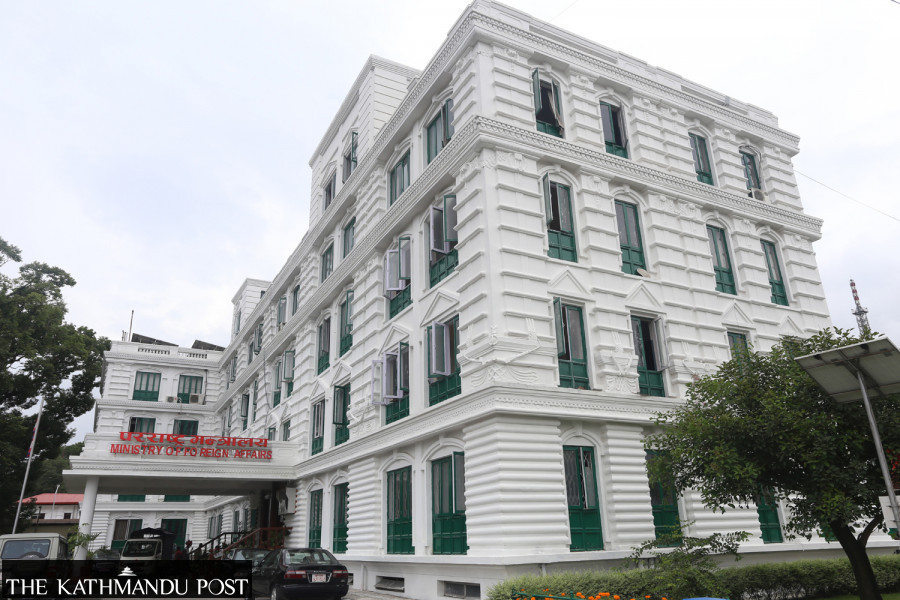National
Ministries to be reminded to enforce diplomatic code
The rules specify how to conduct diplomatic meetings and how office bearers should present themselves.
Anil Giri
The Ministry of Foreign Affairs is writing to all line ministries, including the Prime Minister’s Office, to strictly adhere to the diplomatic code of conduct in order to streamline meetings with foreign officials, leaders, and diplomats. It will also reiterate that all correspondence to foreign countries should be made through the foreign ministry.
Deputy Prime Minister and Minister for Foreign Affairs Narayan Kaji Shrestha has made implementing the diplomatic code his top priority and appears determined to enforce it with urgency. Shrestha became the foreign minister for a second time early this month.
“We are writing to all line ministries once again to adhere to and follow the diplomatic code of conduct,” Amrit Rai, the foreign ministry spokesperson, told the Post. The protocol division of the Ministry of Foreign Affairs is issuing a circular to all line ministries on Friday to follow the code.
Shrestha himself first introduced the diplomatic code of conduct in 2011 when he was the foreign minister in the Baburam Bhattarai Cabinet. Successive governments failed to enforce or follow it despite calls from different sectors for strict adherence to the code for effective communication with foreign nations, agencies and offices.
Article 3 of the code states that the Code of Conduct applies to persons holding public office and officials drawing remunerations and perks from the state treasury. “On the basis of Article 3, we are going to issue the circular again,” a senior official at the protocol division told the Post.
Ahead of his China visit, the deputy prime minister instructed us to issue a letter to all line ministers requesting that they follow the code, said Rai. A copy of the code of conduct is publicly available on the foreign ministry's website. The old text which has been amended multiple times will be circulated, said Rai. “If needed, we will adjust and amend the code according to the suggestions and inputs from the line ministries.”
Last year too, after Pushpa Kamal Dahal became the prime minister, he had decided to enforce the diplomatic code through a Cabinet decision but that did not happen.
Later, when Dahal ditched the political alliance with the CPN-UML, Rastriya Swatantra Party and the Rastriya Prajatantra Party and took the Nepali Congress on board the government, the issue of enforcing the code took a back seat. The diplomatic code is mandatory for all ministers. They are required to meet foreign diplomats and representatives of foreign governments in the presence of a foreign ministry official.
The code’s introduction in 2011 was widely praised by political, bureaucratic and security apparatuses and even by sections of Kathmandu’s diplomatic circle. Initially, only serving politicians and bureaucrats were within the code’s ambit.
It was revised in 2012 and a fresh draft was tabled in the Cabinet, which did not go into the implementation but the Dahal government last year had decided to reinforce it.
A joint-secretary at the foreign ministry said that it never went into force as the political leadership did not commit to following it.
According to officials, the original draft of the code was amended several times and broadened in 2013 and 2014. The DCC has been revised to include the prime minister, ministers, top leaders of political parties, office bearers, and incumbent and former government officials.
Speaking at the House of Representatives on March 19, Deputy PM Shrestha vowed to rigorously enforce the code “very soon”.
“We are going to take a bold step in implementing the diplomatic code of conduct,” he added. “For a broader consensus on foreign relations and diplomacy, an effective diplomatic code of conduct is a must.”
He urged the party leaders, parliamentarians, and elected representatives to keep national interests at the core while engaging in foreign relations and diplomacy. “While keeping national interests at the core, we should be careful of others imposing their own agendas. Our independence, sovereignty, and territorial integrity given to us by our ancestors could face serious challenges. So on the issue of foreign relations, its policy, and conducting diplomacy, we should have a common voice and national consensus,” said Shrestha.
As per the code, the aforementioned officials and leaders must obtain prior approval from the foreign ministry before meeting foreign diplomats and officials and must brief the ministry on the meeting. The code also attempts to regulate political parties and asks them to set up a separate protocol section within the party for recording the contents of meetings as the institutional memory of their organisations.
While meeting foreign dignitaries, parties must also provide the details of their agenda to the concerned government ministries, in case details are sought.
The DCC has also proposed designated venues for party leaders to hold meetings with foreign diplomats and dignitaries. However, this does not apply to courtesy and farewell calls. It also has provisions to curtail the frequent and unnecessary movements of diplomats.
Some political figures had expressed reservations over the content of the DDC during the premiership of Sushil Koirala in 2015.
“The DDC was again tabled in the Cabinet when Koirala was the prime minister but due to reservations from various sections, it was put on hold,” the joint-secretary added. “Successive governments tried to enforce the diplomatic code, but in vain.”
Besides specifying how to conduct diplomatic meetings, the code also states how office bearers should present themselves at diplomatic meetings and functions.
The code requires even former prime ministers to inform the Ministry of Foreign Affairs before meeting ambassadors, diplomats, and foreign leaders.
In 2020, when Oli was the prime minister, then-foreign minister Pradeep Gyawali also publicly announced that the government would revise the diplomatic code and make it compatible and friendly. However, the Oli government failed to implement it.




 10.12°C Kathmandu
10.12°C Kathmandu














